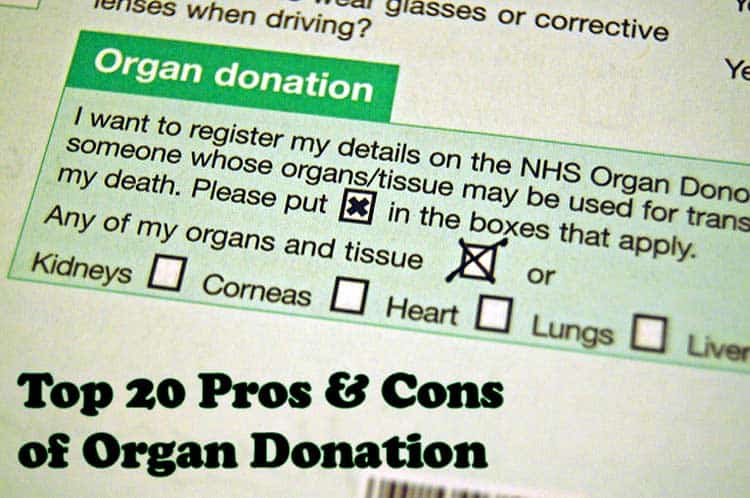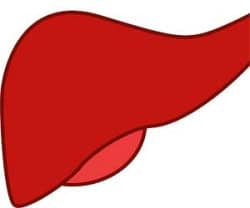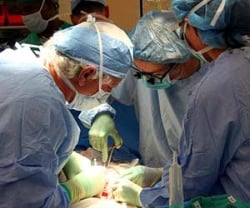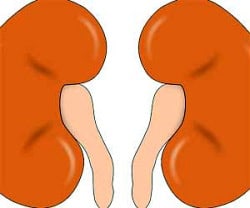Top 20 Organ Donation Pros and Cons
The process of organ donation is viewed as lifesaver while others consider it a useless process. Explore the top 20 pros and cons of organ donation.

Organ Donation Pros and Cons: The human body is an exceptional example of God’s perfection. Any serious illness or accident could result in irreversible loss of organ or part of the body.
If the organ of a person losses after any severe disease or misfortune, it could be replaced with an organ of an individual, willing to donate in his life or after death.
The donation of the organ after death can only take place if the donating person has made a will in his life for donation. Sometimes, the family of the deceased could approve of donating the organ of the departed person.
By many, the process of organ donation is viewed as lifesaver while others consider it a useless process, effective just only for a few months. Let’s have a look at many merits and demerits of organ donation:
Jump to:
- Organ Donation Pros
- 1. Gifting Life
- 2. Multiple Recipients
- 3. Personal Contentment
- 4. No Age Limitations
- 5. Donation Expenses on Receiver
- 6. Prospective Scientific Research
- 7. Liver Re-Growth
- 8. Strengthening Bonds
- 9. Immediate Recovery
- 10. Regaining Normal Lifestyle
- Organ Donation Cons
- 1. Decreased Donors Availability
- 2. Prolong Grievances
- 3. Organ Rejection
- 4. Pain
- 5. Infection
- 6. Less Probability of Relief
- 7. Expensive Procedures
- 8. Late Discharges
- 9. Risks associated with Donor Women
- 10. Blood Loss
- References
- Jump to comments
Organ Donation Pros
Here are the top 10 organ donation pros or advantages:
1. Gifting Life
 Organ donors are rightfully considered as lifesavers. Around the globe, the number of people waiting to receive organs is about 118,000 and start living a normal life.
Organ donors are rightfully considered as lifesavers. Around the globe, the number of people waiting to receive organs is about 118,000 and start living a normal life.
Undoubtedly, organ donors are reflected as blessed people involved in curbing the sufferings of organ receivers, by providing a part of their body.
![]()
2. Multiple Recipients
 According to the statistical record of American Government Information on Organ Donation and Transplantation, an average of 8 lives could be saved by a single individual willing to donate his organs.
According to the statistical record of American Government Information on Organ Donation and Transplantation, an average of 8 lives could be saved by a single individual willing to donate his organs.
The statistical analysis is based upon the number of organs donated by the person, i.e., two kidneys, two lungs, heart, intestine, pancreas, and liver.
Other than vital organs, the cornea of eyes, skin and various body tissues are also donated.
![]()
3. Personal Contentment
 People in the waiting list of getting organs are in massive pain of sufferings as well as patience. Their families are also driven by the endurance of grievances, as their loved one is under continuous agony.
People in the waiting list of getting organs are in massive pain of sufferings as well as patience. Their families are also driven by the endurance of grievances, as their loved one is under continuous agony.
Under the light of this unceasing pain, the organ donor acts as a ray of hopefulness, not only for the sufferer but also the afflicted relatives.
![]()
4. No Age Limitations
 An individual is not refrained by age limitation, in order to donate the organ. People of any age can act as organ donors unless they are not affected by any serious illness or disease.
An individual is not refrained by age limitation, in order to donate the organ. People of any age can act as organ donors unless they are not affected by any serious illness or disease.
The US Department of Human Health and Services denies any specification of age and ethnicity to be an organ donor.
Even children under the age of 18 years are eligible to donate their organs, under the written consent of parents or guardian.
![]()
5. Donation Expenses on Receiver
 Due to the techniques and surgical supplies, the procedure of organ transplantation is an expensive process. However, all the utilities and expenses are free for the organ donor.
Due to the techniques and surgical supplies, the procedure of organ transplantation is an expensive process. However, all the utilities and expenses are free for the organ donor.
Even if the post-surgical complications require the donor to be admitted in the hospital for a few months, the bills and expenditure are free for the person donating the organ and are usually endured by the organ recipient.
The doctors performing the surgical procedure are also involved in doing the job free of any charge.
![]()
6. Prospective Scientific Research
 There were situations when the organs gained, from the process of organ donation, are used for advanced scientific research and medical studies. Such as, in certain situations, the organ donated is not preserved properly and is used for research purposes.
There were situations when the organs gained, from the process of organ donation, are used for advanced scientific research and medical studies. Such as, in certain situations, the organ donated is not preserved properly and is used for research purposes.
Similarly, patients suffering from any genetic diseases are asked to donate their organs, after death, to aid in potential research and development in medial advancement, for saving future lives.
![]()
7. Liver Re-Growth
 In liver transplantation, a part of the liver is donated by the person for donation purpose. The procedure involves fewer risks for the donor as well as the recipients. The liver has a miraculous ability of regrowth and gaining its original size, within a few months.
In liver transplantation, a part of the liver is donated by the person for donation purpose. The procedure involves fewer risks for the donor as well as the recipients. The liver has a miraculous ability of regrowth and gaining its original size, within a few months.
Liver donors do not encounter common problems regarding organ donation, and after a small span, both the recipient and donor start living a normal life as the liver of both becomes approximate to its actual dimension.
![]()
8. Strengthening Bonds
 For organ donation, the first and close relatives are the uppermost choice, in case the organ matching is successful.
For organ donation, the first and close relatives are the uppermost choice, in case the organ matching is successful.
The spirit of sacrificing a part of the body for your loved one not only helps the patient going through the illness but also helps in getting relations closer by firming the bonds, within the family.
Donors receive immense contentment and pleasure, by watching their loved ones recovering from the cruel suffering because of them.
![]()
9. Immediate Recovery
 The advancements in the field of drugs development and medical sciences have led to the facilitation of patients as well as doctors.
The advancements in the field of drugs development and medical sciences have led to the facilitation of patients as well as doctors.
The recovery phase post organ transplantation has reduced immensely as compared to before. The organs transplanted such as liver and kidneys start doing their work inside the body straight away.
For the donor, the use of effective medicines along with better care facilities, lessen the process of recovery, after the surgical procedure. The administration of medicines helps in the prevention of post-surgical infection and pain.
![]()
10. Regaining Normal Lifestyle
 The procedure of organ transplantation results in better quality of life and enhanced living years for the recipient.
The procedure of organ transplantation results in better quality of life and enhanced living years for the recipient.
The patient comes out of prolonging discomfort of organ support, as in the case of patients of kidney dialysis. Recipient regains usual life activities and gets rolling things in life to the fullest.
This transplant affects the lifespan of the recipient also. Life expectancy of the organ recipient increases on average to 10 years.
![]()
Organ Donation Cons
Here are the organ donation cons or disadvantages:
1. Decreased Donors Availability
 It is estimated that the number of people in the waiting list for organ demand is increasing as compared to organ givers per day.
It is estimated that the number of people in the waiting list for organ demand is increasing as compared to organ givers per day.
In 2015, 121,000 people were not able to receive organs due to the lack of organ donors in the United States. The problem has markedly affected the transplantation rate of organs.
The major part of organ donation comes from deceased people instead of living donors that are unwilling to donate their organs.
![]()
2. Prolong Grievances
 During the procedure of organ transplantation, the patient has to endure the painful process of the incision and is kept on persistent life support for an indefinite period.
During the procedure of organ transplantation, the patient has to endure the painful process of the incision and is kept on persistent life support for an indefinite period.
The purpose of life support is to keep the cells and tissue of the body in proper working condition. The period has a critical impact on relatives and family.
To watch someone fighting for life for an extended period is a heartfelt experience through which the relatives have to pass.
![]()
3. Organ Rejection
 It is necessary for the organs of the donor and recipient to match with each other otherwise the transplantation process cannot take place. Before the transplantation process, the tissue cross match takes the place of donor and the recipient. Sometimes, the body of the recipient rejects the donor’s organ.
It is necessary for the organs of the donor and recipient to match with each other otherwise the transplantation process cannot take place. Before the transplantation process, the tissue cross match takes the place of donor and the recipient. Sometimes, the body of the recipient rejects the donor’s organ.
Scientifically, it happens because of the recipient’s immune system rejecting the donor organ or tissue taking it as a foreign entity. Therefore, the organ transplantation is not always successful due to the hindrance of transplant rejection.
![]()
4. Pain
 The process of organ transplantation could be a painful and hurting experience for both the donor and the receiver. The degree of pain and discomfort following the procedure varies depending upon the type of organ transplanted and incision recovery. However, it would be there to some extent.
The process of organ transplantation could be a painful and hurting experience for both the donor and the receiver. The degree of pain and discomfort following the procedure varies depending upon the type of organ transplanted and incision recovery. However, it would be there to some extent.
Doctors prescribe multiple anesthetic medicines (pain relievers) to lessen the after-effects of surgery but time is required by the medicine to manifest their mode of action.
![]()
5. Infection
 Chances of post-surgical infections are frequent in recipient and donor. Due to the lack of specific screening techniques and limited possibilities, an infection may pass on to the recipient from the infected organ of the donor.
Chances of post-surgical infections are frequent in recipient and donor. Due to the lack of specific screening techniques and limited possibilities, an infection may pass on to the recipient from the infected organ of the donor.
Moreover, post-operative mishandling may also lead to the incidence of infections in donors.
![]()
6. Less Probability of Relief
 Due to the increased number of risks involved in the procedure, the process of organ donation has less probability of complete success. The relief to the donor is also on a stake.
Due to the increased number of risks involved in the procedure, the process of organ donation has less probability of complete success. The relief to the donor is also on a stake.
It is estimated that donors of a kidney transplant have lessened life expectancy as compared to normal individuals.
![]()
7. Expensive Procedures
 Due to the technicalities and precisions, the procedure of organ transplant is not easy on finance. During and post-operative requirement of care and support involves an increased number of expenditures.
Due to the technicalities and precisions, the procedure of organ transplant is not easy on finance. During and post-operative requirement of care and support involves an increased number of expenditures.
Even before the surgery is performed, the phase of matching donor and recipient organs is highly priced due to the precision of methods involved to check the donor’s organ of any malfunctioning and infection.
![]()
8. Late Discharges
 If donor considers that he would be discharged immediately after donating his organ then, it is mistaken. The donor has to be kept under the medical supervision of a few days, in order to notify any internal bleeding or hemorrhage.
If donor considers that he would be discharged immediately after donating his organ then, it is mistaken. The donor has to be kept under the medical supervision of a few days, in order to notify any internal bleeding or hemorrhage.
For the recipient, it is definite to be kept under strict observation and care till proper recovery.
![]()
9. Risks associated with Donor Women
 Though the ability to conceive is not affected in donor women, it is important that the doctor needs to be reported of donation when going for conception.
Though the ability to conceive is not affected in donor women, it is important that the doctor needs to be reported of donation when going for conception.
Recently, the issues of increased blood pressure and pre-eclampsia have been reported in women who have donated their organs for transplantation.
![]()
10. Blood Loss
 During the surgical procedure, the incidence of increased bleeding could also occur in donor and recipient.
During the surgical procedure, the incidence of increased bleeding could also occur in donor and recipient.
The importance of preventing the blood loss in the midst of operation is undeniable as it could end up in lethal effects.
The specified cases of blood loss are quite common in liver transplantation procedures.
![]()
Organ donation involves many merits and demerits. However, the purpose of life-saving rightfully denies all the odds. The U. S government supports its people to get them registered as organ donors to lessen the number of 118,000 people waiting in the list, to be gifted a life.
![]()
Cite this page
Bio Explorer. (2026, January 4). Top 20 Organ Donation Pros and Cons. https://www.bioexplorer.net/organ-donation-pros-cons.html/
References
- Cover image source Flickr
- “The Power of Organ Donation to Save Lives Through Transplantation”. Accessed October 26, 2018. Link.
- “Organ Donation Statistics”. Accessed October 26, 2018. Link.
- “Is There an Age Limit for Organ Donation?”. Accessed October 26, 2018. Link.
- “Guidance for Donor and Recipient Information Sharing – OPTN”. Accessed October 26, 2018. Link.
- “Liver regeneration in donors and adult recipients after living donor liver transplantation – PubMed – NCBI”. Accessed October 26, 2018. Link.
- “Why Is Organ Transplantation Clinically Important?”. Accessed October 26, 2018. Link.
- “Deceased organ donation for transplantation: Challenges and opportunities”. Accessed October 26, 2018. Link.
- “Transplant rejection: MedlinePlus Medical Encyclopedia”. Accessed October 26, 2018. Link.
- “Living Donation: Points to Consider”. Accessed October 26, 2018. Link.
- “Infectious Disease Transmission during Organ and Tissue Transplantation”. Accessed October 26, 2018. Link.
- “Benefits and risks of becoming a living organ donor – American Transplant Foundation”. Accessed October 26, 2018. Link.
- “Living kidney donors face higher health risks during later pregnancies: study | CTV News”. Accessed October 26, 2018. Link.
- “Blood loss, predictors of bleeding, transfusion practice and strategies of blood cell salvaging during liver transplantation”. Accessed October 26, 2018. Link.





Thank you. Efficient in doing my assignment for bio.